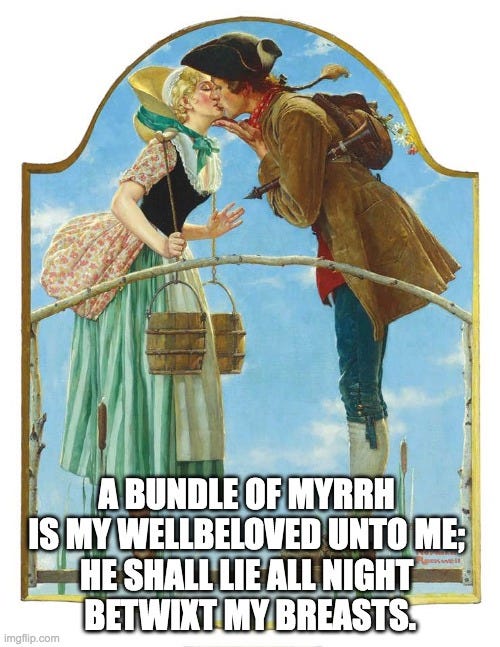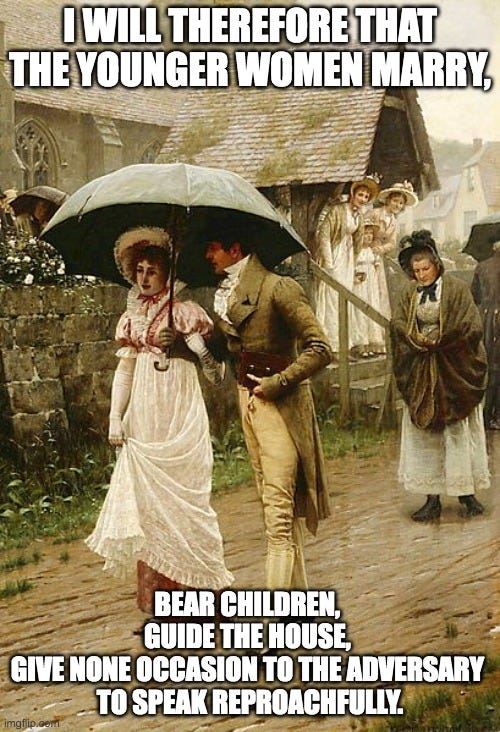“Efficiency,” of course, is futile for the same reason that strong men, will-power and the superman are futile. That is, it is futile because it only deals with actions after they have been performed. It has no philosophy for incidents before they happen; therefore it has no power of choice. An act can only be successful or unsuccessful when it is over; if it is to begin, it must be, in the abstract, right or wrong. There is no such thing as backing a winner; for he cannot be a winner when he is backed. There is no such thing as fighting on the winning side; one fights to find out which is the winning side. If any operation has occurred, that operation was efficient. If a man is murdered, the murder was efficient. A tropical sun is as efficient in making people lazy as a Lancashire foreman bully in making them energetic. Maeterlinck is as efficient in filling a man with strange spiritual tremors as Messrs. Crosse and Blackwell are in filling a man with jam. But it all depends on what you want to be filled with. Lord Rosebery, being a modern skeptic, probably prefers the spiritual tremors. I, being an orthodox Christian, prefer the jam. But both are efficient when they have been effected; and inefficient until they are effected. A man who thinks much about success must be the drowsiest sentimentalist; for he must be always looking back. If he only likes victory he must always come late for the battle. For the man of action there is nothing but idealism.
Gk Chesterton
If you don't know where you are going, any road will get you there.
Lewis Carroll
In today’s age ‘idealism’ has gotten a bad rap. And some bad names: Moralism, preachiness. You literally have Christians writing Christian fiction who say, “I don’t want to be preachy'.” It’s literally what they are commanded to be but, preaching has gotten such a bad rap they run away from it.
When I propose an ‘ideal’ in my letter exchange with
, the term is so anathema to modern readers that it is almost unreadable. Thus this post.Plato
If you talk to people who have overdosed on philosophy and use the word ‘ideal’, they will have this bizarre vision of the perfect chair, or sphere. Feel free to read Plato, but that’s not what I mean when I use the word. Like, not at all.
Desire
To start our journey toward the word ‘ideal’ as I am using it, I think I will begin with the word ‘desire’. You might start to get an idea of what ‘ideal’ means if you ask yourself ‘what do I want?” So the unmarried man might ask himself, “What would be my ideal wife?” How often would she be willing to have sex? What would she know how to cook, well? How well would she keep the house, or entertain guests, or get along with my mother?
Knight in Shining Armour
Meanwhile the girl is dreaming of her knight in shining armor. How handsome he will be or how much money he would make. How would they meet?
This view of ‘ideal’ has to do with her desires. Or, in more plain language, what she wants. What he want. What we want. The ideal son-in-law, the ideal child, the ideal pastor… what do we want them to be? How do we want them to act?
Dog Breeds
Judging the Miniature Schnauzer -Colors: Allowed colors are Salt & Pepper, Black & Silver, and solid Black. Black is the only solid color allowed; a small white spot on the chest or occasional white body hairs are permissible. The Salt & Pepper coat consists of a mixture of solid black, solid white, and banded hairs, varying from light to dark, tan shading permitted. The Black & Silver coat is the same bi-color pattern, except solid black where the salt & pepper would be, and with the difference that the underbody furnishings below the chest & ribcage should be dark. Judging: Watch for any white (even a narrow blaze) in colored area mid-forechest between the silvery white “bow tie” and lighter area of the throat—it’s a DQ.
https://showsightmagazine.com/square-short-straight-judging-miniature-schnauzer/
Now lets approach it from a different direction. Let’s talk about the ‘ideal’ Miniature Schnauzer not from the perspective of the owner, but of the dog show judge. The judge does not have to live with the dog. He does not care how much it yaps at guests, or chews on slippers.
The dog show judge has a list of qualities, published by some dog show organisation, that tells him what the ‘ideal’ Miniature Schnauzer is like. How tall it stands, what its colours should be like, how it should stand, etc etc. He may personally *like* one dog, but has to judge the other a winner. He might want to take one of the dogs home, but the other dog gets the ribbon.
Social Pressure
Now lets look at the idea (not ideal) of social pressure and realise that it is a combination of these two concepts. The gossiping neighbour ladies might like one new wife, but think the other new wife fits the ‘what a new wife should be like’ qualifications better. And they will gossip about… both. A roiling bubbling combination of both ‘I don’t like the way she laughs’ and ‘Her living room is always messy’.
Scripture
And now we come to Scripture. And what
calls moralising :) In Scripture we have the ideal ideal… with no Plato anywhere in sight. In Scripture we learn what God likes, which is the same as what is actually good. The rules we read there are those that work.Monogamy
So when I speak of ‘the ideal’ in my definition of monogamy I am, in the end, pointing to Scripture. But on a lower level there is a lot more packed in there. The dog show judge is represented in the laws of a nation. The gossiping grandmother are there, well, as themselves.
And the lustful young man and dreamy young woman are also represented. When we say that George and Sue are married, we say nothing of the ideal. We don’t know whether she married for love, or money, or because he got her pregnant. We don’t know if he beats her or brings her roses. We don’t know if their sheets are rumpled or if she is frigid.
And the ideal is present both at the overall society level, and the individual level. The society might think that the perfect wife keeps a perfect house, whereas the individual husband might want a girl who drops everything and pays attention to him, even at the cost of the house.
This post is part of my ‘Monogamy’ letter exchange. I make the point there that it is important to realise, when we are discussing any subject but in this case ‘monogamy’, that words and definitions have different aspects. Lassie might be the ideal dog, but she is not the only dog.
So I proposed that when we look at ‘Monogamy’ we need to look at it as having a definition, an ideal, and practical out-workings. Working it out at both levels I’m going to try:
Definition:
(Individual) A man or woman who had no sexual or romantic partner before their first, and who entered and continued in a sexual relationship with one partner (spouse) of the opposite sex for the rest of their life.
(Marriage) A man and woman who, having had no sexual or romantic partner before their first, entered and continued in a sexual relationship with each other (as spouse) for the rest of their lives.
(Society) A culture or sub-culture who practice (2) exclusively.
Ideal
(Individual) All of the hopes, aspirations, and rules that an individual has in regards to their spouse, consistent with the definition above.
(Marriage) All of the hopes, aspirations, and rules that a man and a woman have in regards to their spouse and marriage, consistent with the definition above.
(Society) All of the hopes, aspirations, and rules that a man and a woman, and their surrounding culture or sub-culture have in regards to their spouse and marriage, consistent with the definition above.
Practical
All of the exceptions to the definition and ideals above that exist in an individual, marriage, or society despite their overall adherence to them. Thus a man who visits a prostitute is violating the definition and ideal of monogamy, but his overall framework may still be monogamous. A man and woman who have an ‘open marriage’ might live in a society which is, in the main, monogamous, but their ‘marriage’ is in violation to that definition and ideals.
Introduction and Conclusion
So what? Why is it important?
Because, even speaking to a pragmatist (which I am very much not) part of what a culture ‘does’ is promote its ideals. It uses social pressure, legal pressure, and often a variety of cultural tricks (like chaperones) to enforce various social ideals. I remember once when I was in eighth grade I was at a boarding school and they were having a dance. And the group of older boys that I was part of (an official group, not my buddies. My wing of the dorm.) didn’t find it acceptable that I would not go to the dance, or not have a date. So they literally picked me up and carried me over to the girl and dumped me in front of her, with instructions to ask her. Which, when I got done laughing, I did. And she accepted. Nice girl. No, I didn’t marry her. That story involves an airport, a guitar, and PNG Pidgin.
So when we are looking at the overall issue of monogamy and society, it is very important, and very relevant, that we look at what the goals, desires… ideals of that culture are. Are they changing? In the 50’s the average girl (I would say ‘secular’ but they didn’t really do that back then) wanted everyone to know she was a virgin (even if she wasn’t). Today she wants everyone to know she is ‘experience’, even if she isn’t.
For both the individual marriages and the larger culture, the ‘ideal’ of the culture or sub-culture will determine what people assume will happen in a marriage going into it. In certain African cultures a woman will go into marriage expecting to be beaten, and expecting to yell at her husband. All cross cultural marriages involve differing expectations and ideals. Conflict between the ideal, and contradictions between the ideal and the reality, will cause stress.
HT
Links
Chesterton’s ‘Feminine Ideal’
https://vonwriting.substack.com/p/the-feminine-ideal
Lewis’s High Ideals
https://vonwriting.substack.com/p/high-ideals-by-cs-lewis
The Death of Sex
Wow, there’s a lot of work to do to define monogamy! One problem with definitions is that they tend to be specific to particular cases, particular disciplines. Even when two people are literally talking about the same thing, they may use different words because of the differences in the way that thing affects their discipline.









